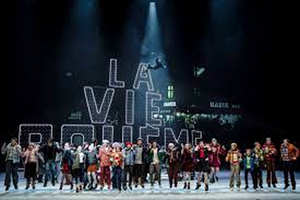LA BOHEME Comes to Teatr Wielki Beginning Next Week
Performances run December 4-11, 2022.

Before Giacomo Puccini began composing La Bohème , which became one of the most played operas in the world, he planned an opera about the life of the Buddha. At the same time, he was attracted to the erotic wolf with the action taking place in Sicily. He was dissuaded from the latter project by Wagner's stepdaughter and Liszt's granddaughter, who was terrified in this story by the intensity of brutality. Puccini, with the help of seasoned librettists - Luigi Illiki and Giovanni Giacosa - proceeded to freely adapt Scenes from the Life of Bohemia , a famous book by Henry Murger, without embellishments showing the miserable vegetation of the Parisian "artistic proletariat".The book won me over on the spot. I felt like in a family: freshness, youth, passion, cheerfulness, tears shed in silence, love that gives you joy and makes you suffer. There are people, feelings, there is a heart. But above all, there is poetry, divine poetry, marveled Puccini, who found in Murger a lot of well-known experiences. After his success , Manon Lescaut (1892) was able to buy a villa in Torre del Lago, but he still remembered the hungry and cold student years he had spent in Milan.
No wonder that the same subject interested another composer, who recovered from poverty and wanted to show "real life" in opera. Ruggero Leoncavallo, the author of the brilliant Clowns , started to compose La Bohème around the same time as Puccini . Both artists clashed with each other in the press polemic, but it was Puccini who settled the dispute: Let him compose, and I will compose, and the audience will judge . This was also the case with the loss for Leoncavall, about whom no one remembers La Bohème today, so much obscured by the charm of the immortal music of the rival.
Four young artists: Schaunard, Rodolfo, Colline and Marcello set off for the city on a winter evening. When Rodolfo meets Mimi, it's love at first sight. They fall in love with each other before they can introduce themselves. Marcello, on the other hand, is devastated because he meets his former lover Musetta, who now wraps the rich Alcindor around her finger. It's a time of love and crazy fun. A few months later, Marcello lives again in a turbulent relationship with Musetta, and struggling with a lack of money, Rodolfo abandons a seriously ill Mimi, frustrated and terrified by his helplessness in the face of her suffering. It is a time of frustration, jealousy and confusion. Mimi and Rodolfo will meet again, but then it will be too late for help and love.
La Bohème is directed by Barbara Wysocka, who previously staged the operas of Philip Glass ( The Holocaust of the Usher House ), Pascal Dusapin ( Medeamaterial ), Eugeniusz Knapik ( Moby Dick ), Ludomir Różycki ( Eros and Psyche ) and Giacomo Puccini ( Tosca ) on the Warsaw stage.
Barbara Wysocka, director: La Bohème is a story about great emotions, partings and returns, about ruthless destiny and loss. What will be the most important in this staging? The image of the artist community in the landscape of a big city, the theme of illness as the "night side of life" and the story of love that does not always win and sometimes loses to illness and death .
Comments

Videos
.png)